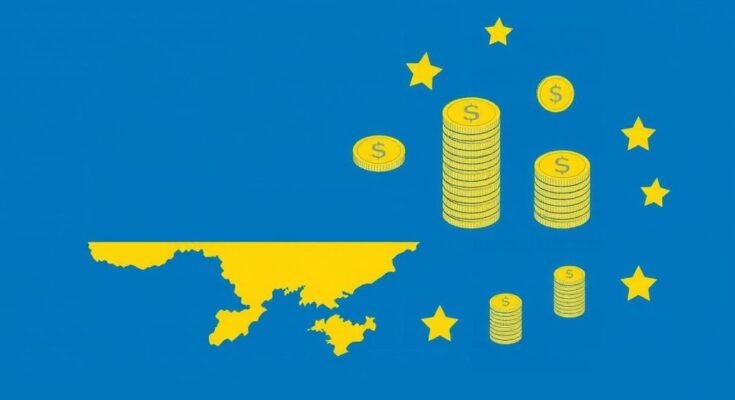The European Union will provide 18.1 billion euros (about $19 billion) to Ukraine as part of a $50 billion G7 loan agreement, crucial for addressing Ukraine’s immediate needs amid ongoing Russian aggression. This financial aid highlights the EU’s commitment to supporting Ukraine during uncertain political times in the U.S. and reinforces efforts to hold Russia accountable for its actions.
On November 28, 2024, the European Union announced its commitment to provide 18.1 billion euros (approximately $19 billion) to Ukraine, part of a larger $50 billion package orchestrated by the Group of Seven (G7) nations, aimed at supporting Ukraine amid ongoing conflict with Russia. This funding initiative, which also encompasses contributions from the United States and other G7 members, is critical for Ukraine as it faces challenges regarding the future of U.S. assistance, especially in light of anticipated political changes in the United States.
Valdis Dombrovskis, a senior EU official, confirmed the financial commitment, emphasizing the necessity of the funds to aid Ukraine’s immediate requirements. Ukrainian Prime Minister Denys Shmygal praised the EU’s decision, highlighting its significance not merely as financial support but as a mechanism to hold Russia accountable for its aggression. Thus far, the EU has immobilized approximately $235 billion of Russian central bank assets since the onset of the invasion in 2022, reinforcing the financial measures taken against Russia.
This new funding builds upon the previous 120 billion euros in assistance provided by the EU and its member states since the conflict began, underlining the EU’s sustained commitment to support Ukraine during these tumultuous times. The mechanism through which these funds will be disbursed demonstrates a concerted effort to leverage frozen assets to finance Ukraine’s crucial needs.
The ongoing conflict in Ukraine, exacerbated by the Russian invasion that began in 2022, has necessitated substantial international financial support. The European Union, along with other G7 countries, has been a key player in providing economic assistance to ensure Ukraine’s resilience against military aggression. The freezing of Russian assets has facilitated the available financial resources aimed at bolstering Ukraine’s economy and stabilizing its international relations.
In summary, the EU’s allocation of 18.1 billion euros to Ukraine represents a significant financial intervention amidst ongoing geopolitical tensions with Russia. This decision is not only aimed at providing immediate financial relief but also includes broader implications concerning accountability for aggression against Ukraine. As the international community continues to rally behind Ukraine, the preservation of financial support remains pivotal, particularly with uncertainties surrounding future U.S. assistance.
Original Source: www.seychellesnewsagency.com




